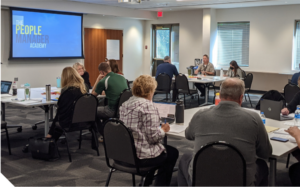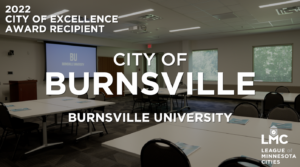Burnsville University Provides Unique City-Focused Training
By Deborah Lynn Blumberg
The City of Burnsville has long embraced a culture of learning. When the city’s 290 employees took courses or training, though, there wasn’t a central hub that organized learnings. Managers who wanted to take a leadership course often had to find one themselves.

“There was training happening, but it wasn’t a coordinated effort,” says Bethany Brewer, manager of organizational development and strategic initiatives for the City of Burnsville.
When Gregg Lindberg took the job as Burnsville deputy city manager in 2019, he came with a background in organizational development and human resources. In his previous position at a local government agency, he and Brewer had implemented a “university” for staff. Trainings and leadership courses at the agency were coordinated through a central hub. Staff chose and enrolled in classes from a catalogue just like they would at a college or university.
Lindberg wanted to create the same type of offering in Burnsville. Brewer joined Burnsville in March 2021, and two months later the two launched Burnsville University — the city’s home for everything related to employee training and development.
The city won the League of Minnesota Cites 2022 City of Excellence Award for its initiative.
Creating a library of classes
Prior to 2021, Burnsville employees would receive compliance, legal, workplace safety, and other trainings through human resources. Individual departments had their own development budget. Staff could tap into those funds to attend conferences or take classes.
The idea behind an organizational university run in-house is that content is customized to the organization, Brewer says, and makes a connection to the city’s values.
“In local government, our organization is unique, our culture is unique, and so our learning can be reflective of what makes us unique,” says Lindberg, who is now city manager. “About our community, we say the variety Burnsville offers invites all people to be themselves. As city manager, I want to make sure employees feel that way as well.”
With Burnsville University, Lindberg and Brewer divided course offerings into seven distinct categories, or schools of training, to address employees’ unique needs, including: onboarding, leadership development, professional development, safety and health, organizational learning, inclusion and belonging, and employee wellbeing.
They worked to build a library of content of around two dozen classes, created a course schedule for the entire year, wrote course descriptions for each in-person class, and then printed a hard copy catalogue for employees. A pdf version is also available.
Brewer, who’s a Gallup-certified strength coach, wrote original training content to add to existing materials she had previously developed for the city as a contractor. She created and put together workbooks for each class, and she teaches and facilitates many courses with help from outside facilitators.
Targeted content
City employees can enroll through the online learning system in as many courses as they like when the catalog comes out at the start of each year. Or, they can choose courses of their liking throughout the year. Managers, too, can recommend courses to their employees based on employees’ career goals and interests.
Courses are both one-offs and class series. “It’s a wide range so we can make it accessible for what people can fit in to their schedule,” Brewer says. “The success of it is very much dependent on employees being interested and able to participate.”
The University’s classes include a strengths class, during which employees unpack their unique strengths and learn how to apply them to their work; an emotional intelligence leadership course; and a class that shows leaders how to create a thriving culture of wellbeing at work.
Staff also take away practical, hands-on advice from classes like Negotiation 101; How to Be a Great Mentor; Effective Workplace Communication; Adult and Child First Aid and CPR; and Living Our Brand: What is Community Engagement. This year, city leaders are excited to offer a Meet Your Neighbor class, during which a member of the local Somali community will speak to city employees.
As part of the University, employees can also attend “Tuesdays with TED,” a lunchtime series held from noon to 1 p.m. each month during which staff watch an interesting, relevant TED talk and then discuss it with their peers over lunch.
Last year’s offerings featured entrepreneur and author Denise Barreto’s presentation “Care More, Fear Less” and journalist Celeste Headlee on “10 Ways to Have a Better Conversation”. This year, videos will include “Where Good Ideas Come From” by innovation expert Steve Johnson and “The Power of Vulnerability” from author Brené Brown.
The TED talks are especially popular, Brewer says, as are courses on emotional intelligence, workplace communication, and having difficult conversations. To facilitate access, classes are offered in a variety of settings around the city, including Burnsville City Hall and other city-managed buildings.
Building life skills
Perhaps one of the most popular parts of the University are courses led by city employees themselves. Staff present on topics in which they have expertise, and the classes are well attended.
Staff-led classes have included Fire Ops 101, in which employees learn more about firefighters’ (who are also paramedics) day-to-day work, and a Citizens Academy, during which employees get an insider’s view into the city’s police officers’ responsibilities and tasks.
Employees have also enjoyed tours and explanations of the city’s water treatment plant and a tree pruning course by Burnsville’s forestry employees. The city’s Police Department crime analyst gave an Excel class that was also very well attended. This year, the city’s Fleet Department will hold a car maintenance class, and the building official is teaching a home inspection workshop.
“It’s these practical topics that help to connect all of our staff,” says Kayli Knighton-Johnson, who now oversees Burnsville University, helping to coordinate courses, produce the catalogue, and speak with staff about the educational and developmental opportunities they’re seeking. “The most attended classes are those ones put on by peers.”
The city’s courses, Brewer adds, fit well with the city’s strategic priority of organizational culture. “We create a great experience for employees so they can do the same in our community,” she says. In 2021, Burnsville University facilitated 55 different learning experiences for 600 participants. In 2022, it was 90 different learning experiences for over 1,700 participants. “People are very grateful to have the opportunity to learn and grow,” Brewer says. “They view it as the organization making an investment in them as well.”
Adds Knighton-Johnson, “It shows your intentionality of wanting your people to be their best. Also, having courses owned by people across the organization helps to break down silos and it brings people together.”
Knighton-Johnson says that often staff chatting in the hallway about a particular challenge will inquire about a course that might help them solve the issue. “If there’s not,” she says, “we say, no, but we’ll find one!”
Adding an e-learning component
Upcoming plans for the University include ultimately creating e-learning experiences as well to make learning even more accessible for staff primarily working out in the community like those plowing snow or police officers. Brewer would also like to pilot a program where neighboring city employees could participate in Burnsville’s courses as well.
For other cities that are interested in starting their own University, Brewer says there are simple ways to start out if funds aren’t readily available to hire a program coordinator. Cities could tap into their training and development funds and contract out a consultant to teach six to eight learning experiences, she says.
Then, those could be supplemented with classes and experiences offered by city employees to their peers, and even Tuesdays with TED sessions, which cost nothing to host. A simple catalogue or a one-page flyer for the selection of offerings would be simple to create and print. “This would be a really easy place to start,” says Brewer.
Knighton-Johnson says that it’s critical to have a group of people in your city, and especially among leadership, who can champion the University. “It’s important to get someone really from every level of the organization,” she says. “Having advocates at every level of the organization will make implementation much easier.”
She also recommends starting small to test the waters. The best way to begin is by consulting staff about their interests and goals.
“Be intentional about listening to staff to see what they would be interested in learning about,” Knighton-Johnson says. “Then, you can tell your staff: invest in yourself with these types of courses, and your job will get easier.”
Deborah Lynn Blumberg is a freelance writer.


